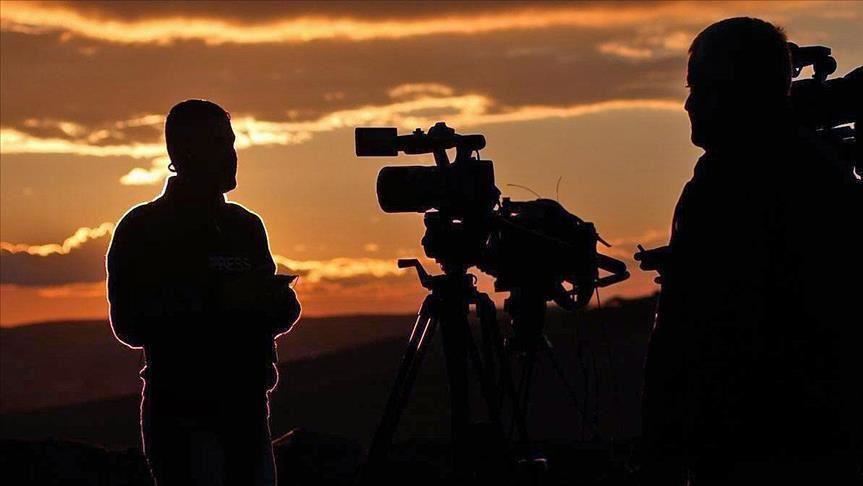Bangladesh: Free press woes amid controversial surveillance law
Number of media has rapidly grown, now freedom of press and professionalism need to be ensured, experts say

DHAKA, Bangladesh
The media in Bangladesh is again in the spotlight for Sunday’s World Press Freedom Day amid worries over how a controversial new law might impact freedom of expression and the country’s mass media.
“Under this draconian and controversial act, any police official even with normal rank has been given the power to arrest any journalist or harass any media outlet under the petty excuse of spreading rumor against the government,” Rezwan Siddiqui, editor of local Dainik Dinkal daily, told Anadolu Agency.
Pointing to various clauses of the act, Siddiqui added: “The authoritarian Aawami League government under Sheikh Hasina enacted the law with the ill motive of curbing the minimum scope of free journalism. Now journalists hardly dare report on any issue that may go against the interest of the government.”
Amid massive opposition by journalists and rights activists, Bangladesh passed the Digital Security Act in October 2018 amid concerns that it might go against the spirit of the country’s constitution, putting restrictions on freedom of speech and freedom of expression.
In a report published this March, Amnesty International said that more than 1,000 cases have so far been filed under this act in Bangladesh.
Journalists being silenced
“Journalists in Bangladesh are being silenced under the draconian Digital Security Act,” said Saad Hammadi, South Asia Campaigner at Amnesty International.
“Recent cases against journalists, including a prominent newspaper editor, a journalist who was tortured, and a newspaper editor feared to be a victim of enforced disappearance are chilling reminders that freely expressing one’s views in Bangladesh can come at a very high cost.”
Media rights group Freedom of Expression, Bangladesh (FExB) in a report last week, said nearly two dozen journalists in Bangladesh were attacked, intimidated, harassed, or arrested for reporting on pilfering, corruption and lack of accountability in food aid meant for poor people during the nationwide coronavirus lockdown since March 26.
In the World Press Freedom Index 2020 released by Reporters Without Borders in April, Bangladesh ranked 151 out of 180 countries in the world. “Bangladeshi journalists are among the first collateral victims of the hardening of power in the Awami League since 2009,” reported the local New Age daily, citing the report.
Siddiqui added: “There is no press freedom in Bangladesh now as all TV channels are mostly controlled by people belonging to the ruling Awami League party. Only a few newspapers trying to act freely are under immense government pressure that they have no scope to criticize any government misdeed.”
Referring to recent drives against illegal casino business and other corruption, he said if media was allowed to do in-depth reporting, names of many high-profile figures close to or belonging to the government would come out.
“I just prefer to say that the media in Bangladesh has flourished tremendously in recent years but freedom of press has not been ensured,” Siddiqui added.
Rapid growth
Speaking to Anadolu Agency, former Dhaka University Vice Chancellor and professor of Mass Communication and Journalism AAMS Arefin Siddique, however, said that Bangladeshi media is currently enjoying more freedom than in any other previous time.
“There is a huge number of private TV channels, daily newspapers, private radio stations, and online news portals in Bangladesh. This was possible as the Sheikh Hasina government prioritized the information technology sector, keeping pace with its slogan to form a ‘Digital Bangladesh’,” Arefin Siddique said.
According to data compiled by private media research body Bangladesh NGOs Network for Radio and Communication (BNNRC), as of May 2019 Bangladesh had 44 television channels, 28 FM and 32 community radio stations, 1,187 daily newspapers, and more than 100 online news portals as approved by the Ministry of Information.
In reply to the mass concerns over the Digital Security Act, Arefin Siddique said the government should ensure that no one including the administration can misuse this law to harass any media or journalists. “But the role of media must be more responsible and based on truth and facts. Very often some media in Bangladesh publish news based on fake and fabricated information,” he added.
Act to curb abuse
Defending the Digital Security Act, the government said mainstream media outlets that properly follows media guidelines and are not spreading propaganda against the harmony of the country have nothing to be worried out.
“Even in advanced countries you see some laws that are functioning to curtail the abuse and misuse of media. Those who will not violate the country’s privacy and do not spread false and fabricated news to create confusion and disrupt peace will not be harassed by this act,” Iqbal Sobhan Chowdhury, media advisor to Prime Minister Sheikh Hasina, told Anadolu Agency.
Calling the safety and security of media and journalists his first priority, Chowdhury, also one of country’s most senior journalists, added: “Our voice will always be raised against any step of misuse or abuse of this law and no administrative wing of the government will be allowed to take any unethical advantage of the act.”
Anadolu Agency website contains only a portion of the news stories offered to subscribers in the AA News Broadcasting System (HAS), and in summarized form. Please contact us for subscription options.







